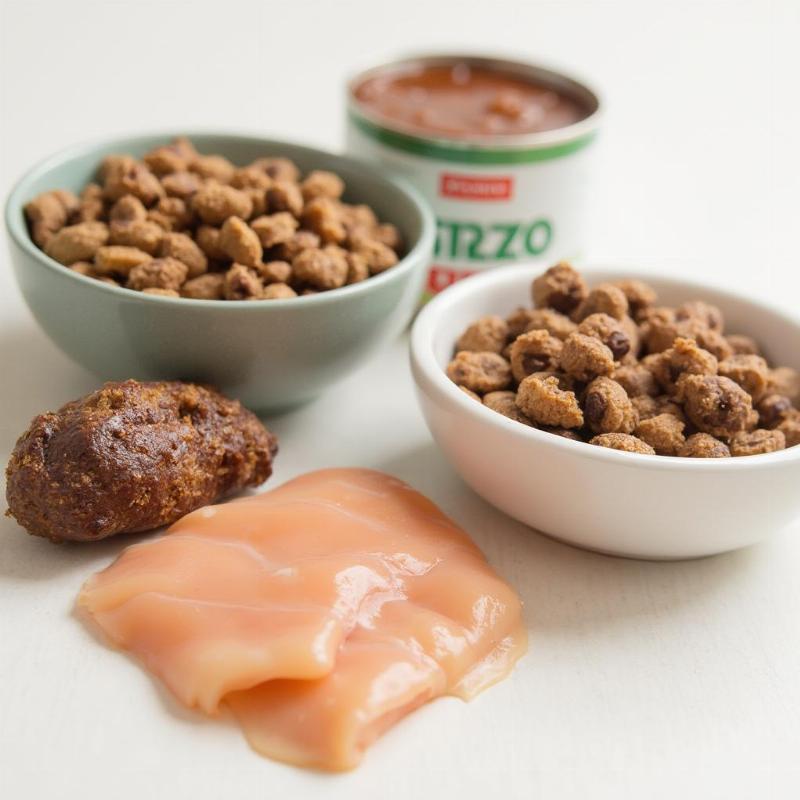Underweight dogs can be a cause for concern. Ensuring your furry friend reaches a healthy weight is crucial for their overall well-being and vitality. Proper nutrition plays a vital role in achieving this goal. Choosing the best food to help your dog gain weight involves understanding their specific needs and selecting nutrient-rich options. This article will delve into the various factors that contribute to weight gain in dogs and provide a comprehensive guide to selecting the right food for your canine companion.
Similar to home remedies for dog itching and losing hair, addressing weight issues requires a holistic approach.
Understanding Canine Weight Gain
Why is my dog underweight? Several factors can contribute to a dog being underweight, including underlying medical conditions, inadequate nutrition, or a combination of both. A thorough veterinary checkup is essential to rule out any medical reasons for weight loss.
Identifying Underlying Medical Issues
Certain medical conditions, such as parasites, digestive problems, and metabolic disorders, can hinder a dog’s ability to absorb nutrients efficiently. Addressing these underlying health issues is paramount before focusing on dietary changes.
Assessing Nutritional Needs
Once medical conditions are ruled out, assessing your dog’s nutritional requirements becomes the next step. This involves considering factors such as age, breed, activity level, and current weight. Puppies, for instance, have different nutritional needs compared to adult or senior dogs. Similarly, highly active dogs require more calories than those with a sedentary lifestyle.
Best Dog Foods for Weight Gain
What kind of food should I give my dog to gain weight? High-quality, calorie-dense foods are essential for healthy weight gain. Look for foods with increased protein and fat content.
Protein Powerhouses
Protein provides the building blocks for muscle development and repair. Choosing foods rich in high-quality animal protein sources, such as chicken, beef, fish, or lamb, is crucial for optimal weight gain.
Healthy Fats for Energy
Fats are an excellent source of concentrated energy. Look for foods with healthy fats, such as those from fish oil, chicken fat, or flaxseed oil. Avoid foods with excessive saturated or trans fats.
 High Protein Dog Food Options
High Protein Dog Food Options
Choosing the Right Carbohydrates
While carbohydrates are important for energy, opt for complex carbohydrates over simple sugars. Look for foods with whole grains, such as brown rice, quinoa, or oats. These provide sustained energy and fiber for digestive health.
Just like choosing the best allergy medicine for dogs with itchy skin, selecting the right food requires careful consideration.
Feeding Strategies for Weight Gain
How can I help my dog gain weight fast? While increasing food intake is crucial, it’s essential to do so gradually to avoid digestive upset.
Gradual Increase in Food Portions
Start by increasing your dog’s food portion by 10-15% and monitor their weight. Adjust the portion size as needed until a healthy weight gain is achieved.
Frequent, Smaller Meals
Feeding smaller, more frequent meals can be beneficial for dogs with sensitive stomachs or those who struggle to eat large portions at once.
 Dog Eating Smaller Meals
Dog Eating Smaller Meals
Adding Healthy Supplements
Certain supplements, such as fish oil or probiotics, can further support weight gain and overall health. Consult with your veterinarian before adding any supplements to your dog’s diet.
Much like flea and tick pills for dogs without a vet prescription, dietary supplements should be used responsibly.
Monitoring Progress and Adjusting the Plan
How do I know if my dog’s weight gain plan is working? Regular monitoring is crucial to ensure your dog is gaining weight healthily.
Regular Weigh-Ins
Weigh your dog weekly or bi-weekly to track their progress. Keep a record of their weight and adjust the feeding plan as needed.
Veterinary Checkups
Regular veterinary checkups are essential to assess your dog’s overall health and ensure the weight gain plan is effective and safe.
Conclusion
Helping your dog achieve a healthy weight requires careful attention to their nutritional needs and overall health. By choosing the Best Food To Help Dog Gain Weight and implementing appropriate feeding strategies, you can support your furry friend’s journey to a healthier and happier life. Remember to consult with your veterinarian for personalized guidance and to address any underlying medical conditions.
FAQ
- What is the best food to help a senior dog gain weight?
- Can I give my dog homemade food for weight gain?
- How much weight should my dog gain per week?
- What are the signs of unhealthy weight gain in dogs?
- Are there any specific breeds prone to being underweight?
- How can I encourage my picky eater to eat more?
- What are some healthy treats to help my dog gain weight?
